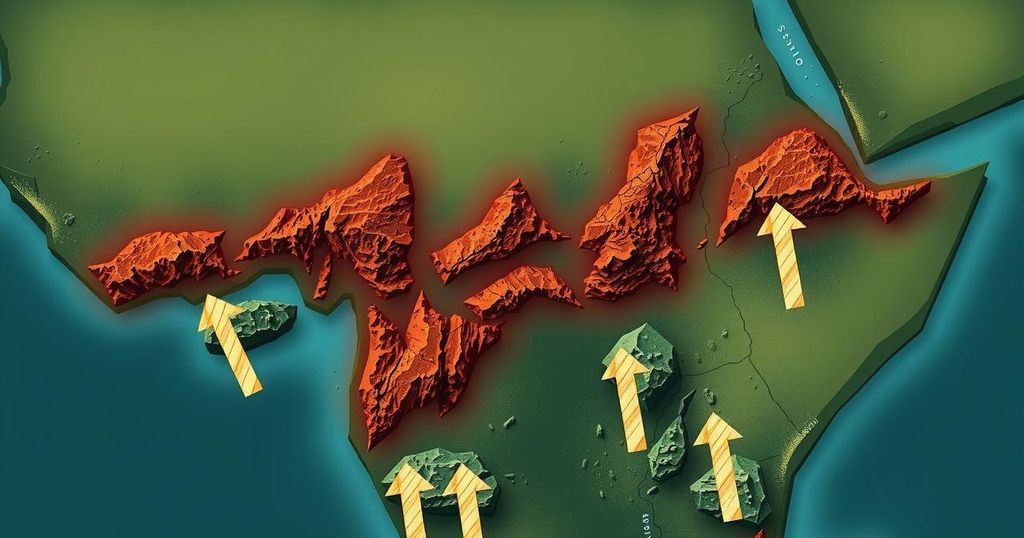Are South Sudan Opposition Groups Part of the Problem, Not the Solution?
South Sudan’s opposition groups struggle to unite and effectively challenge the authoritarian regime due to fragmentation and personal ambitions. Their lack of a coherent national agenda undermines their credibility, leaving the government unchallenged. A compelling and nationalistic leadership, combined with international support for political development, is essential for fostering democracy and peace in the country.
In South Sudan, internal rebellion remains unlikely due to deeply entrenched familial ties and a small, insular leadership. While the current regime may face some occasional dissent, it is often rooted in personal ambition rather than a collective political vision. The lack of political literacy and strong institutions further cements the government’s control. A successful popular uprising or viable alternative to military action necessitates a unified opposition capable of mobilizing the populace, which is currently lacking.
Effective political change in autocratic regimes typically relies on a credible and unified opposition. Unfortunately, South Sudan’s opposition groups are predominantly fragmented, focusing on personal ambitions rather than a cohesive national agenda. This disunity weakens their resolve and enables the ruling regime to maintain power, with many groups failing to emerge as viable alternatives in pursuit of national unity.
President Kiir and his close associates utilize various tactics to maintain their political power by coercing rivals and manipulating the political landscape. The opposition appears complicit, with many factions established merely to capitalize on regime tactics instead of promoting effective governance. As a result, they often prioritize personal agendas and local grievances over the collective national good.
Many opposition entities are ephemeral, emerging primarily during peace negotiations and quickly disbanding under pressure. They typically focus on political bargaining rather than strategic planning for nation-building. Rather than presenting structured alternatives, they perpetuate issues akin to those faced by the government, marked by patronage and shifting alliances.
The historical rivalries and power struggles prevalent since the liberation movement shape the internal dynamics of opposition groups, often compromising their effectiveness. Their preference for militarized strategies further erodes trust among the public and the international community, exacerbating instability. Instead of engaging with grassroots communities, they have become disconnected, primarily pursuing personal ambitions with foreign allies, deviating from a coherent national vision.
The track record of these opposition groups reflects a trend of failed agreements and fragmentation, undermining their credibility. Although they profess to offer an alternative to the regime, they often replicate its detrimental practices. There remains a pressing need for them to develop institutions that can facilitate peaceful governance and establish a convincing framework for sustainable peace and national cohesion.
Despite their current shortcomings, opposition groups still have the potential to unite under a strong, collective front, transcending past grievances and personal ambitions. By fostering a visionary outlook towards national stability and prosperity, they can ignite a sense of unity among all communities in South Sudan.
Achieving this opposition requires a leader with vision and the capacity to bridge ethnic divides. Such leaders must also engage meaningfully with grassroots communities to build a unifying narrative for South Sudan. Only by resisting narrow interests can they redefine their approach and attract international support, providing a hopeful future for the nation.
The persistence of the authoritarian regime is tied to the divisions within opposition groups. The pressing question is whether they will remain mired in factional disputes or unite under a shared purpose that addresses national grievances. History teaches that effective political movements can induce significant change, evidenced by armed groups transitioning into legitimate political entities elsewhere.
The role of international support in fostering political development cannot be understated. Historical precedents from various nations underline the importance of investing in political parties as transitional societies evolve from armed conflict to democratic processes. It is essential for South Sudan to strengthen political movements to ensure viable alternatives to military governance.
Political instability in South Sudan results from a lack of structured political parties, chiefly due to historical neglect and inadequate support for their development. The absence of a strong political foundation hinders any potential transition to democracy, revealing the critical need for coherent political engagement beyond military frameworks.
Supporting both established political parties and grassroots civic movements, such as the People’s Coalition for Civil Action (PCCA), is vital for democracy in South Sudan. While providing assistance to political factions amid their transformation can be challenging, fostering viable civic movements can create opportunities for alternative political competition. Investment in party development is key to disrupting a cycle of military elite governance and promoting political agency among the populace.
To summarize, opposition groups in South Sudan face significant challenges in unifying and offering credible alternatives to the current authoritarian regime. Their fragmentation and personal ambitions have hindered their ability to represent national interests effectively. A shift towards cohesive and visionary leadership, alongside international support for political development, is crucial for fostering a more democratic and peaceful future for South Sudan. The need for a robust and inclusive opposition cannot be overstated in the quest for a stable and prosperous nation.
Original Source: www.radiotamazuj.org




Post Comment